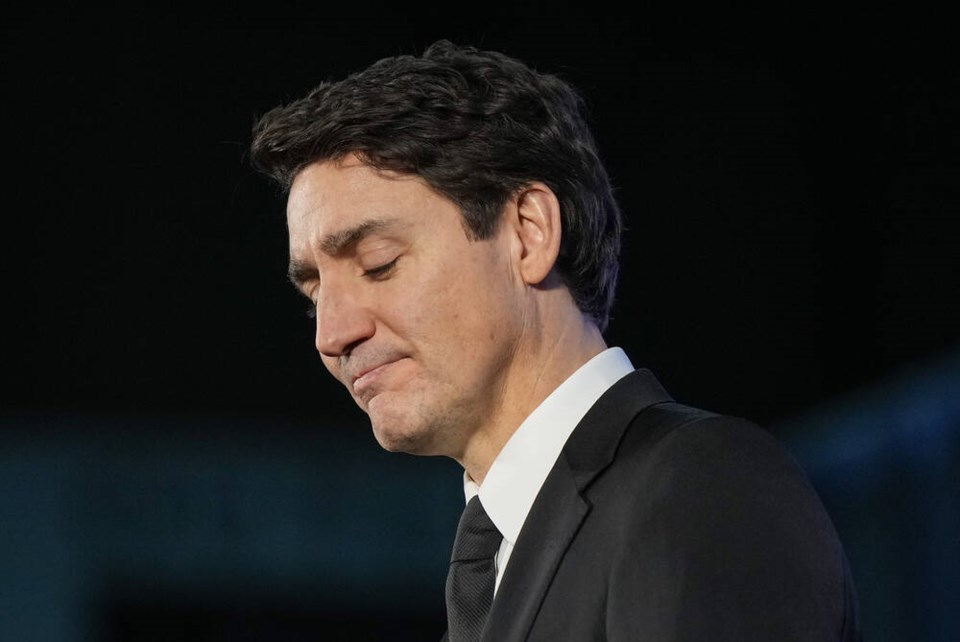Four decades ago, his father took his famous walk in the snow to decide to leave the country’s highest office. In recent days, the son took to the British Columbian ski slopes to determine how to do so, too.
In literature, snow can provide a backdrop for moments of existential resignation or of a quiet acceptance of fate. Prime Minister Justin Trudeau’s acceptance of his political fate has been anything but quiet, until perhaps the end.
He has held on and on, as we saw painfully in recent months with U.S. President Joe Biden below the border and even BC United Leader Kevin Falcon nearby, until it was beyond obvious that something other than public service was the personal compass.
But with what he called “internal battles” too massive to surmount – while neglecting to cite public opinion that was hurtling toward single-digit support – Trudeau announced Monday he cannot be the standard-bearer of the Liberal party he has kept in power for nearly a decade.
What we will get immediately is a paralyzed, prorogued Parliament until March 24, when Trudeau’s replacement will either from inside or outside of the Commons be the prime minister seized with retaining confidence of the chamber or facing an election that today would wreak oblivion on what has been long termed Canada’s “natural governing party.”
It is an ugly departure to a starry arrival, when Trudeau injected legitimate enthusiasm in politics and became, like his father Pierre, an international celebrity as prime minister. In that period, which was brief but which we tend to forget so soon, it appeared that Canada had the ear of the world on climate change, on equity and on a progressive value set.
Trouble arrived quickly, though, first with backing off on his promise of introducing proportional representation – something he mentioned Monday as a regret – then a series of speed bumps he raced over that wrecked the alignment of the political vehicle he was driving.
There were ethical breaches (the Aga Khan vacation, the WE Charity, and the SNC-Lavalin controversy), the policy considerations and political contradictions that come with managing a government grappling with climate change and resource development, the promise followed by the slumbering progress of Indigenous reconciliation, and the hellhole of the pandemic that proved an inflection point on his character when he made the classic mistake of criticizing his citizens. And, of course, who can forget blackface?
It was lost on some of his supporters that Trudeau had first been picked to lead mainly because of his electability, not his particular vision for the country, and as time went on, it became clearer that the task was larger than the man and would eventually devour him. Too many attached the same ardor and awe to him as the country had to his father, but he was more of a tactician than a strategist, more visceral than intellectual. I have too many memories of Pierre as a cerebral gymnast and Justin as an evasive acrobat.
Even so, he never lost to the alternatives across the aisle – a drawn-out Stephen Harper, and successors Andrew Scheer and Erin O’Toole – and leaves office technically undefeated, if unquestionably deflated. His successor might elevate the party from polling in third place nationally, but Trudeau has so overstayed and entrenched a resolve – not just about him, but about the Liberal team – as to make Conservative Leader Pierre Poilievre an inevitability in 2025 as prime minister. The outgoing and incoming prime ministers alike have no small tasks in engaging the second-term Donald Trump, and the focus on a domestic leadership race for the next two months is hardly helpful to Canada in the presidential short-term.
History ought to show Trudeau’s administration reduced poverty and marginally improved the tax burden for the middle class, but he leaves office in a financial strait that makes one wonder if there will ever be a balanced budget again. A little like his father, he didn’t make fiscal policy a focus. A lot like his father, his impetuousness could at times be his folly, and the trait made him more a vessel of polarization than cohesion, more of division than unity in the country.
I remember interviewing Harper in the days before his 2015 defeat and saw in Trudeau at the microphone Monday the same body language of relief that the inhumane physical and emotional toll of resistance to the country’s will could stand down now. After a bit of scripted ceremony, the prime minister could speak more candidly and relax in knowing it was over.
Kirk LaPointe is a Glacier Media columnist with an extensive background in journalism.



